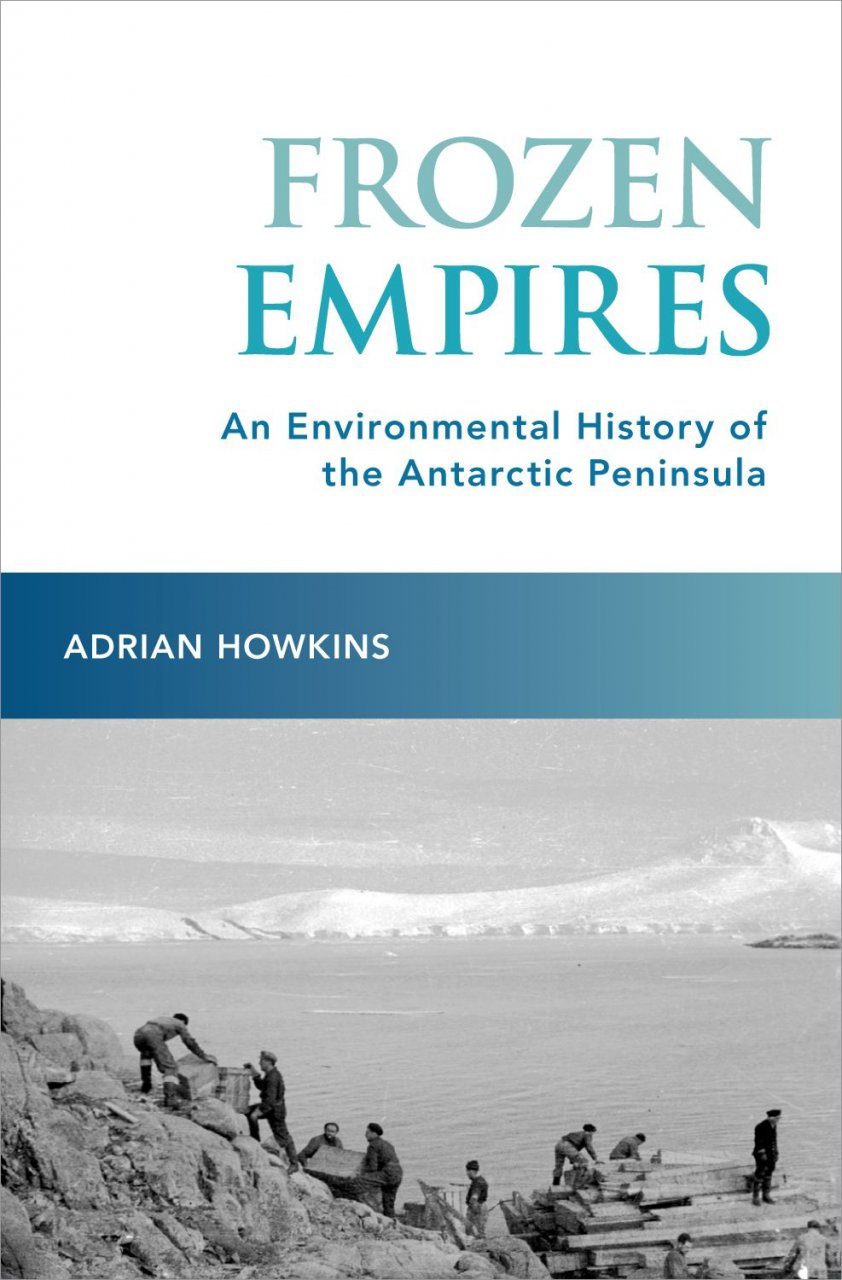| Image taken from the front cover of Adrian Howkin’s book – Frozen Empires |
The recent release of the paperback edition of Frozen Empires: An Environmental History of the Antarctic Peninsula, offers an opportunity to revisit the arguments I made in this book and reflect on how it continues to shape my work in Antarctica and thinking about environmental history. The book sets out to frame the mid-twentieth century Antarctic sovereignty dispute among Argentina, Britain, and Chile as an environmental history of decolonization. Through a strategy I refer to as asserting ‘environmental authority’, Britain used the performance of scientific research and the production of useful knowledge to support its imperial claims to the region as a territory known as the ‘Falkland Islands Dependencies’. Argentina and Chile both contested Britain’s claim, and put forward their own assertations to sovereignty based on a sense that this was their environment as a result of proximity, geological contiguity, and shared climate and ecosystems. In the contest between British assertions of environmental authority and Argentine and Chilean ‘environmental nationalism’ it was the imperial, scientific vision of the environment that largely won out. There was no genuine decolonization of the Antarctic Peninsula region, or the Antarctic continent more generally. Instead, the 1959 Antarctic Treaty, which remains in force today, retains pre-existing sovereignty claims in a state of suspended animation (‘frozen’ in the pun of the treaty negotiators) and perpetuates the close connection between science and politics across the Antarctic Continent.
Much of my work since researching and writing Frozen Empires has focused on the history of the McMurdo Dry Valleys on the opposite side of the Antarctic continent. I am a co-PI on a US National Science Foundation funded Long Term Ecological Research (LTER) project, collaborating with scientists to ask how historical research might inform our understanding of this unique place. The McMurdo Dry Valleys are the largest predominantly ice-free region of Antarctica and since the late 1950s have become an important site of Antarctic science. Geologists are attracted to the Dry Valleys by the exposed rock, geomorphologists by the opportunity to study the glaciological history of the continent, and ecologists by the presence of microscopic ecosystems. The close connection between politics and science that I identified in the Antarctic Peninsula is also applicable to the history of the McMurdo Dry Valleys. The two most active countries in the region, New Zealand and the United States, can both be seen as making assertions of environmental authority to support their political position. A major difference is that now I find myself on the inside of this system, working with scientists to help produce the ‘useful information’ that is being used for political purposes.
Working as more of an insider in a system I critiqued in Frozen Empires raises a number of awkward questions. Can I retain a critical distance? Am I contributing to the perpetuation of an unequal system? What might the decolonization of Antarctic research look like? These questions are not easy to answer. Not infrequently I find myself looking back on the lack of inhibition I felt while researching and writing Frozen Empires and wishing for something similar in my current research. Academic collaboration by definition leads to entanglements, and these entanglements increase complexity. It is much easier, for example, to write critically about the imperial history of Antarctica than to convince scientific colleagues that this imperial history continues to have an impact on contemporary scientific research.
But for all the messiness and difficulties involved in collaboration, there are also tremendous opportunities. I have learned a lot about how science gets done through working with the McMurdo Dry Valleys LTER site, and I have learned about working as part of an academic team. Place-based studies offers an ideal opportunity for interdisciplinary research, and I think it is vital to have humanities perspectives represented in these collaborations. It takes time – often more time than expected – for effective collaborations to develop, and this process involves a significant degree of mutual learning. Researching and writing Frozen Empires fundamentally shaped what I bring to the table as an environmental historian in the McMurdo Dry Valleys project, and I remain convinced by its argument for imperial continuity. But the process of engaging in collaborative research has unsettled at least some of my earlier positions, and the book I’m writing on the history of the McMurdo Dry Valleys will likely be quite different to Frozen Empires.
—————————————-
This blog is written by Cabot Institute member Dr Adrian Howkins, Reader in Environmental History, University of Bristol.
It has been reposted with kind permission from the Bristol Centre for Environmental Humanities. View the original blog.

